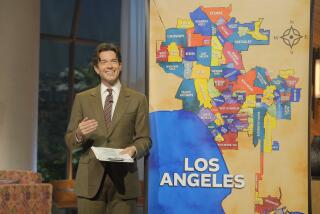Falling late-night ad prices will shape Conan’s and Leno’s futures
- Share via
Want to buy a commercial to welcome Jay Leno back as host of NBC’s “The Tonight Show”? It’ll run you only about $35,000.
If that sounds like a lot, a few years ago that ad time would have gone for $50,000.
For all the hype about the futures of Leno and Conan O’Brien, the era when a comedian could be crowned the undisputed “king of late night” is, like the price of a 30-second spot in one of their shows, on the ebb -- and with it, the economics underpinning late-night TV.
The world that O’Brien entered when he began his first late-night show 16 years ago is radically different from the one that will greet him when he returns to the air. Those changes are likely to shape everything from where O’Brien lands to how much he will be paid and the format of the show -- band or no band? -- he will host.
Night owls and insomniacs, who not long ago had only a handful of talk shows from which to choose, now have dozens to flip through. And those programs, which once could count on a stable audience, are growing vulnerable as viewers with digital video recorders watch on their own timetables -- or simply catch the good snippets on Hulu or YouTube.
“The standard late-night talk show format is not as relevant to the viewing audience in 2010 as it was 10 years ago,” said Jon Swallen, senior vice president for research at TNS Media Intelligence, an industry consulting firm.
“When everybody is famous for 15 minutes, it is no longer worth 15 minutes of a viewer’s time to tune in and see it.”
Audience erosion
Indeed, as late-night shows like those hosted by Jon Stewart or Stephen Colbert sprouted on cable, viewers have gradually tuned out the networks’ counterparts. The combined audience for NBC’s, ABC’s and CBS’ late-night programs has fallen 20% from five years ago, according to Nielsen Co.
More troubling: The group of viewers 18 to 49 years old -- the spend-happy cohort that sponsors most want to reach -- has plunged 36%.
Advertisers, not surprisingly, are fleeing too.
In 2007, the shows featuring Leno, O’Brien, David Letterman and the rest of the late-night network TV brigade commanded about $720 million in advertising, TNS estimates. Through the first nine months of 2009 they pulled in only $500 million, on pace to fall significantly short of two years earlier.
Although some of the decline in ad revenue can be blamed on the economy, much of it is due to fundamental changes in the media landscape.
A 24-hour news cycle and the proliferation of celebrity-obsessed websites like TMZ and cable channels like E! have siphoned much of the fuel that powered late-night talk shows. Viewers don’t have to wait until late night for a comedian’s monologue and riff on the news or unctuous interview with a movie star, because now the media mill grinds through topical subjects all day long.
As a business, late-night talk shows face the fast-rising costs and audience fragmentation that have eroded prime time, said Marc Graboff, chairman of NBC Entertainment.
“You have to control your costs to make any kind of profit,” he said. “That’s the big difference between now and five years ago.”
Spending money
One of NBC’s arguments in moving Leno into prime time was that, although his show would garner fewer viewers than a drama, its lower production costs would lead to higher profits.
But that doesn’t mean a late-night retinue of producers, writers, stagehands and assistants -- O’Brien’s “Tonight Show” employed 190 people -- plus the host come cheap.
Letterman and Leno each pull down more than $30 million annually, said people familiar with the productions, and O’Brien earned $12 million. ABC’s Jimmy Kimmel makes $8 million to $10 million, these people said.
Innumerable factors go into producing a late-night talk show, and the costs add up.
CBS’ “Late Show With David Letterman” and NBC’s “The Tonight Show” each cost $1.5 million to $2.5 million a week to produce. Those costs include a producer who can pull down as much as $300,000 annually and writers who earn $3,500 to $10,000 a week, depending on seniority. A talent booker -- responsible for lining up celebrity guests -- gets $3,000 to $6,000 a week.
And, of course, any late-night talk show worthy of the name has its own band -- which can run the network $1 million annually. Songs, too, cost a pretty penny: Every time Paul Shaffer on “Late Show” strikes up a cover of “Fortunate Son” or “Brown Sugar,” the show pays $1,500 to $3,000 in rights fees. Even a week’s worth of reruns still runs into the six figures.
Then there are sundry expenses like flying guests in and putting them up in a hotel; providing car service; and keeping the “green room,” where people wait before they walk out on stage, stocked with catered food and drink.
So perhaps it shouldn’t come as a surprise that, according to NBC insiders, O’Brien’s “Tonight Show” was on track to lose $20 million this season -- a contention O’Brien’s representatives dispute.
Making money
When Leno was hosting the show, it generated about $50 million annually in profit, said a person familiar with its financial performance at the time. CBS’ “Late Show With David Letterman” also turns a hefty profit.
Of course, the media giants that air late-night shows also use them to hype content from other parts of the company. For example, Harrison Ford popped up on Letterman’s show on CBS last week and chatted about his new movie, “Extraordinary Measures” -- produced by CBS Films.
Regardless, the profit margins for all late-night shows are shrinking, so the networks are reining in costs. CBS, for example, will be paying a lower license fee to Letterman’s production company, Worldwide Pants, over the next few years, people familiar with that deal said, as the show’s audience size and ad revenue are expected to slide.
The bottom line
That doesn’t mean late-night TV itself will go into that good night. The shows, although not the Texas gushers they used to be, still pump returns.
“It’s still a profit center. They wouldn’t be going through the nonsense if it wasn’t,” said former Letterman producer Robert Morton.
But shrinking advertising and increased competition are among the factors that networks -- both broadcast and cable -- will weigh as they ponder whether it would be worthwhile to bring O’Brien aboard for a late-night talk show.
Given how the economics of late-night television have been devolving, the paycheck O’Brien gets from his next employer may be nowhere near the size of the one he received from his former.
More to Read
The biggest entertainment stories
Get our big stories about Hollywood, film, television, music, arts, culture and more right in your inbox as soon as they publish.
You may occasionally receive promotional content from the Los Angeles Times.











